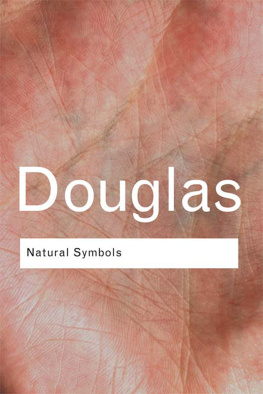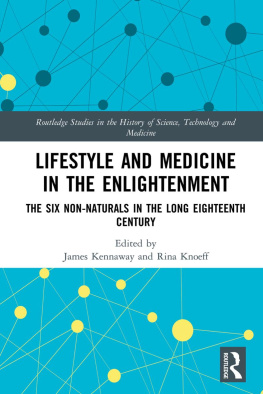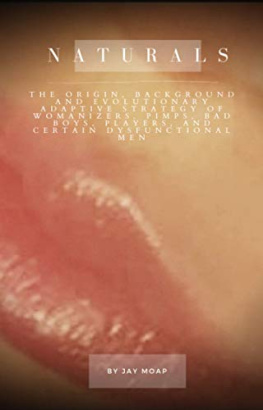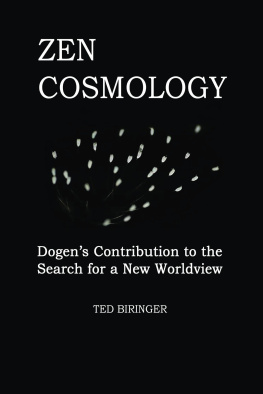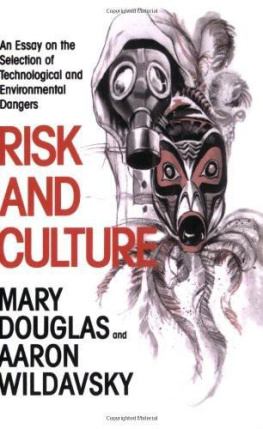Douglas Professor Mary - Naturals symbols: explorations in cosmology
Here you can read online Douglas Professor Mary - Naturals symbols: explorations in cosmology full text of the book (entire story) in english for free. Download pdf and epub, get meaning, cover and reviews about this ebook. City: London;New York, year: 2010, publisher: Routledge, genre: Religion. Description of the work, (preface) as well as reviews are available. Best literature library LitArk.com created for fans of good reading and offers a wide selection of genres:
Romance novel
Science fiction
Adventure
Detective
Science
History
Home and family
Prose
Art
Politics
Computer
Non-fiction
Religion
Business
Children
Humor
Choose a favorite category and find really read worthwhile books. Enjoy immersion in the world of imagination, feel the emotions of the characters or learn something new for yourself, make an fascinating discovery.
- Book:Naturals symbols: explorations in cosmology
- Author:
- Publisher:Routledge
- Genre:
- Year:2010
- City:London;New York
- Rating:5 / 5
- Favourites:Add to favourites
- Your mark:
- 100
- 1
- 2
- 3
- 4
- 5
Naturals symbols: explorations in cosmology: summary, description and annotation
We offer to read an annotation, description, summary or preface (depends on what the author of the book "Naturals symbols: explorations in cosmology" wrote himself). If you haven't found the necessary information about the book — write in the comments, we will try to find it.
Naturals symbols: explorations in cosmology — read online for free the complete book (whole text) full work
Below is the text of the book, divided by pages. System saving the place of the last page read, allows you to conveniently read the book "Naturals symbols: explorations in cosmology" online for free, without having to search again every time where you left off. Put a bookmark, and you can go to the page where you finished reading at any time.
Font size:
Interval:
Bookmark:

Mary Douglas's writing remains as fresh and vivid as ever. The ideas put forward in Natural Symbols have been taken up well beyond the discipline of Anthropology, and should remain compulsory reading for all students of religion and society.
Fiona Bowie, University of Bristol
As timeless as the subtitle. Essential reading for all those enthralled by her brilliant insights into the meaning of the Bible thirty years on.
John Sawyer, Lancaster University
Natural Symbols is clearly a major work in the greatest of sociological traditions, the Durkheimian. It has an originality unmatched for a generation among the writings of anthropologists. It raises questions that are important and soluble not in the field but by the harder, less inviting, work of reflection and analysis.
Times Literary Supplement
Natural Symbols is so interesting that one hopes that... it will be read and become part of not one but a number of debates in the social sciences in their most vital aspects as central forms of the self-consciousness of our age.
Times Literary Supplement
Mary
Douglas
Explorations in cosmology

First published 1970
by Barrie & Rockliff, London
Second edition first published by Routledge 1996
First published in Routledge Classics 2003
by Routledge
2 Park Square, Milton Park, Abingdon, Oxon, OX14 4RN
711 Third Avenue, New York, NY 10017 (8th Floor)
Routledge is an imprint of the Taylor & Francis Group, an informa business
1970, 1973, 1996 Mary Douglas
Typeset in Joanna by RefineCatch Limited, Bungay, Suffolk
All rights reserved. No part of this book may be reprinted or reproduced or utilised in any form or by any electronic, mechanical, or other means, now known or hereafter invented, including photocopying and recording, or in any information storage or retrieval system, without permission in writing from the publishers.
British Library Cataloguing in Publication Data
A catalogue record for this book is available from the British Library
Library of Congress Cataloging in Publication Data
A catalog record for this book has been requested
ISBN10: 0415314542 (pbk)
ISBN13: 9780415314541 (pbk)
This book is obviously not intended solely for anthropologists. I hope it will be a bridge between anthropology and other disciplines. Yet anthropologists must be its most important critics, for only they can judge the soundness of my interpretations of field reports and bring up material which can either confirm or spoil my hypotheses. I have tried to limit myself to sources which are both accessible and of very high quality, so that if my uses of them seem idiosyncratic, anyone can go back to the original reports and check. But in the long run, as the perspectives I wish to develop have not been in the minds of field researchers, only new research, especially devised, can test these arguments.
It remains for me to thank those who have helped me most directly. First I thank the Dominicans at Blackfriars, Oxford, for inviting me to give the St Thomas Day lecture on 7 March 1968, and for publishing The Contempt of Ritual in New Blackfriars (June, July 1968, 49: 475 82, 52835). Theirs was the initial stimulus for the book. Further I thank Professor Kenneth Little and the Court of Edinburgh University for inviting me to deliver the Munro lectures in May 1968. For earlier work on this subject I am grateful to the Woldingham Association Committee and especially to Reverend Mother Eyre, Mary Don and Mona Macmillan. The research we hoped to promote on religious education has not yet been accomplished. At least this is offered as a sketch of some of the issues we hoped to tackle.
The first formal acknowledgement I must make is to Basil Bernstein. My debt to him is very apparent and I ask his pardon if the use I have made of his ideas is inept. I am grateful to the Reverend Cornelius Ernst, OP, and to Peter Brown for reading the manuscript, and to David Schneider, Victor Turner and Nur Yalman for their discussions of lectures given on its basis in Chicago this year. I am also grateful to Bryan Wilson and Godfrey Lienhardt for kindly reading and commenting on parts of the manuscript, and to James Woodburn and to Daniel de Coppet for permission to quote from studies still awaiting publication, and to Rodney Needham for a seminar paper on natural symbols which helped me to focus my interest. I record gratefully my husband's unflagging attempt to keep the argument on the track and thanks to Janet for helping with the bibliography.
Mary Douglas
July 1969
Many difficulties and sources of confusion still remain in this Pelican edition. To try to unify so many fields of anthropology was a very ambitious task. Clearly another ten years of scholarly research would have made it more presentable. However, events move faster than study can. If this exercise in comparative cosmology has any relevance for the way we justify our own behaviour, it should be set forth with the least delay. Once made public, the weakness of the argument, step by step and example by example, could be criticized. The thesis was too complex to unfold in less space, too difficult to discuss piecemeal without laying down the whole, and too difficult to work out further in private study. Therefore, I published it when I did and wish to acknowledge my gratitude for the painstaking criticisms it has received. Particularly Professor Robin Horton, Professor Philip Gulliver, Dr Deane Neubauer and Mr Michael Thompson have been most constructive. I wish also to thank Professor Thomas Luckmann for encouraging me to make a revised edition at once and for his suggestions about how to set about it. It will be apparent that I have not been able to avail myself of all the helpful criticisms. The main difference between the two editions is the attempt to clarify the central dimensions of grid and group on which the rest hangs. Instead of indicating a separate quadrant for each type of society, I am now thinking of scatter patterns across the diagram to show the group pressures and the coherence of the classificatory scheme which can be assessed from ethnography or historical biography. If the reasoning is sound, we can go a great deal further than the phenomenologists who have been saying for some time that the perceived universe is socially constructed. We should be able to say what kinds of universe are likely to be constructed when social relations take this or that form.
Now that Professor Bernstein's work Class Codes and Control (1971) is published, my book shows up more obviously as the other side of his thesis. This meets a criticism from those who felt I had not fully explained the relevance of his work to my ideas. The revised grid and group is derived from his discussion of the ways the curriculum can be constructed. He has been interested in revealing how speech forms, and now the curriculum, encode the pattern of social relations, mediate and reinforce it. Any given curriculum is justified by a cosmology which states the ultimate principles in the universe, and which derives from these principles the proper way to teach human beings. As he looks beneath the curriculum to the pattern of power which is being hammered out in bargaining over the staff-meeting table, so I try to look beneath the overt cosmology to the pattern of power which it realizes. And one step further, I have tried to identify with the type of cosmology and social pattern a distinctive coding of ritual forms. The coding of ritual forms corresponds to the coding of speech forms in Basil Bernstein's earlier work. The curriculum is seen as a system of boundaries: likewise the tribal culture. His study of the curriculum examines the main varieties which differ in the strength of the boundaries used. The difference between strong boundary maintenance and weak boundary maintenance in education is analogous to the difference between ritual and anti-ritual in types of religion. This theme of the variable strength of the boundaries of cognitive systems I was forced to explore after writing
Font size:
Interval:
Bookmark:
Similar books «Naturals symbols: explorations in cosmology»
Look at similar books to Naturals symbols: explorations in cosmology. We have selected literature similar in name and meaning in the hope of providing readers with more options to find new, interesting, not yet read works.
Discussion, reviews of the book Naturals symbols: explorations in cosmology and just readers' own opinions. Leave your comments, write what you think about the work, its meaning or the main characters. Specify what exactly you liked and what you didn't like, and why you think so.

